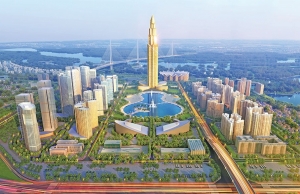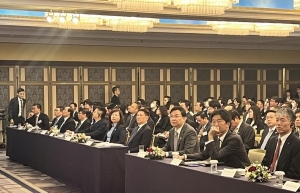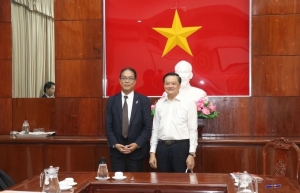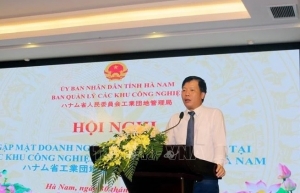Japanese bold on ventures in real estate
 |
| Vietnamese partners must have managing and operations experience to be of use to Japanese groups, photo Le Toan |
In early August, Cosmos Initia, a 50-year-old high-end real estate company and a member of Daiwa House Group, entered into a joint venture with Vietnam’s TT Capital Investment and Japan’s Koterasu Group to start construction of TT AVIO apartments in Di An city of the southern province of Binh Duong. This project focuses on affordable housing, providing around 2,000 apartments. Eighty per cent of these are 60sq.m and priced at under $83,000 per unit.
Additionally, Cosmos Initia and Koterasu Group plan to pump another $150 million in TT Capital over the next five years, with the aim of bringing about 1,000 affordable housing units to the market each year.
Samty Asia Investment (SAI), another Japanese real estate developer, partnered with Vinhomes in July to develop The Star in Ho Chi Minh City, which will feature four buildings with nearly 2,000 apartments.
The Star is a subproject of Vinhomes Grand Park, one of the largest housing schemes in Ho Chi Minh City, comprising over 70 buildings, schools, hospitals, supermarkets, shopping centres, office buildings, and large parks, with a total population of more than 80,000.
This is SAI’s second venture in Vietnam. Previously, in 2021, SAI collaborated with Vinhomes to develop The Sakura residential scheme in a smart city urban area located in west Hanoi.
Japanese investors are also developing projects in areas outside of core urban zones. In April, Kim Oanh Group worked with three Japanese partners to jointly develop an urban area of nearly 50 hectares in Binh Duong province, with capital of more than $1 billion.
The three Japanese companies – Sumitomo Forestry Group, Kumagai Gumi Group, and NTT Urban Development Company – will hold 49 per cent of the capital, while the remaining stake belongs to Kim Oanh Group.
Historically, many large-scale Japanese enterprises have entered the Vietnamese market. Notable among them are Sumitomo Corporation and BRG Group, which have jointly developed a smart city project in northern Hanoi. Marubeni and Hung Thinh Group have also signed an agreement to develop ventures in Thu Duc of Ho Chi Minh City.
Other prominent investors include Nishitetsu Group and Nishi-Nippon Railroad, in cooperation with Nam Long Group for housing, Tokyu with Becamex IDC in housing developments, and Kajima in a joint venture with Indochina Capital in hospitality and industrial property.
Experts note that the Vietnamese real estate market is attractive to Japanese investors due to its potential for long-term growth. Factors such as a shortage of housing, rising incomes, and revised laws also contribute to a more transparent and sustainable real estate market.
“If in the past, Japanese businesses primarily entered the market through mergers and acquisitions, they are now more actively seeking projects and directly participating in the implementation process. In particular, the affordable housing segment remains a priority in Japanese portfolios,” Nguyen Hoa, an expert on Japanese investments, told VIR.
For Japanese financial backers, in addition to requiring a clean land bank with full legal compliance, the capacity and experience of the leadership of potential partners are highly valued.
“Vietnamese partners do not necessarily need to own many projects in the market, but they must have substantial experience in managing, operating, and developing real estate, with a track record of success,” Hoa added.
Nguyen Dinh Truong, a representative of TT Capital, said that partnering with Japanese investors in real estate comes with significant pressure due to their cautious approach when putting money into the Vietnamese market.
“Japanese investors have high standards for selecting partners. Project standards are thoroughly evaluated, which may slow progress but, conversely, helps limit risks,” Truong said.
Lawrence Lennon, director of Capital Markets at CBRE Vietnam, said that the country’s strong economic fundamentals indicate that the market remains resilient. For investors, the key was to strategise according to the current stage of each key sector in northern, central, and southern Vietnam, while adapting to the broader structural shifts occurring globally.
“We’re continuing to see strong appetite among foreign investors to enter the market, with a focus on the industrial and logistics space (spurred by the trade war), the hospitality market as the world re-opens post-pandemic, and core asset classes driven by the country’s unique supply and demand dynamics,” he said.
 | Japanese investors catch the eye in real estate sector Many domestic real estate developers are expecting to cooperate with Japanese investors as strategic partners to receive capital and share the management capacity. |
 | Vietnam’s stock market on the radar of Japanese investors Japanese investors expressed an interest in Vietnam’s stock market at a conference themed “Vietnam – Investment Destination” in Tokyo on March 12. |
 | Japan to sponsor over 28 million USD for Can Tho city's smart city project The People’s Committee of Mekong Delta city of Can Tho on July 24 held a working session with Fujitsu Limited of Japan on a project on providing technical support for the locality, aiming to build a smart city model through digital transformation in land management. |
 | Japanese investors pour over 1.3 billion USD into Ha Nam The Management Board of Industrial Parks in the northern province of Ha Nam on August 30 held a meeting with Japanese enterprises that are investing in industrial parks in the province. |
What the stars mean:
★ Poor ★ ★ Promising ★★★ Good ★★★★ Very good ★★★★★ Exceptional
Related Contents
Latest News
More News
- Vietnam, New Zealand seek level-up in ties (February 19, 2026 | 18:06)
- Untapped potential in relations with Indonesia (February 19, 2026 | 17:56)
- German strengths match Vietnamese aspirations (February 19, 2026 | 17:40)
- Kim Long Motor and AOJ Suzhou enter strategic partnership (February 16, 2026 | 13:27)
- Haiphong welcomes long-term Euro investment (February 16, 2026 | 11:31)
- VIFC in Ho Chi Minh City officially launches (February 12, 2026 | 09:00)
- Norfund invests $4 million in Vietnam plastics recycling (February 11, 2026 | 11:51)
- Marico buys 75 per cent of Vietnam skincare startup Skinetiq (February 10, 2026 | 14:44)
- SCIC general director meets with Oman Investment Authority (February 10, 2026 | 14:14)
- G42 and Vietnamese consortium to build national AI infrastructure (February 09, 2026 | 17:32)

 Tag:
Tag:

















 Mobile Version
Mobile Version